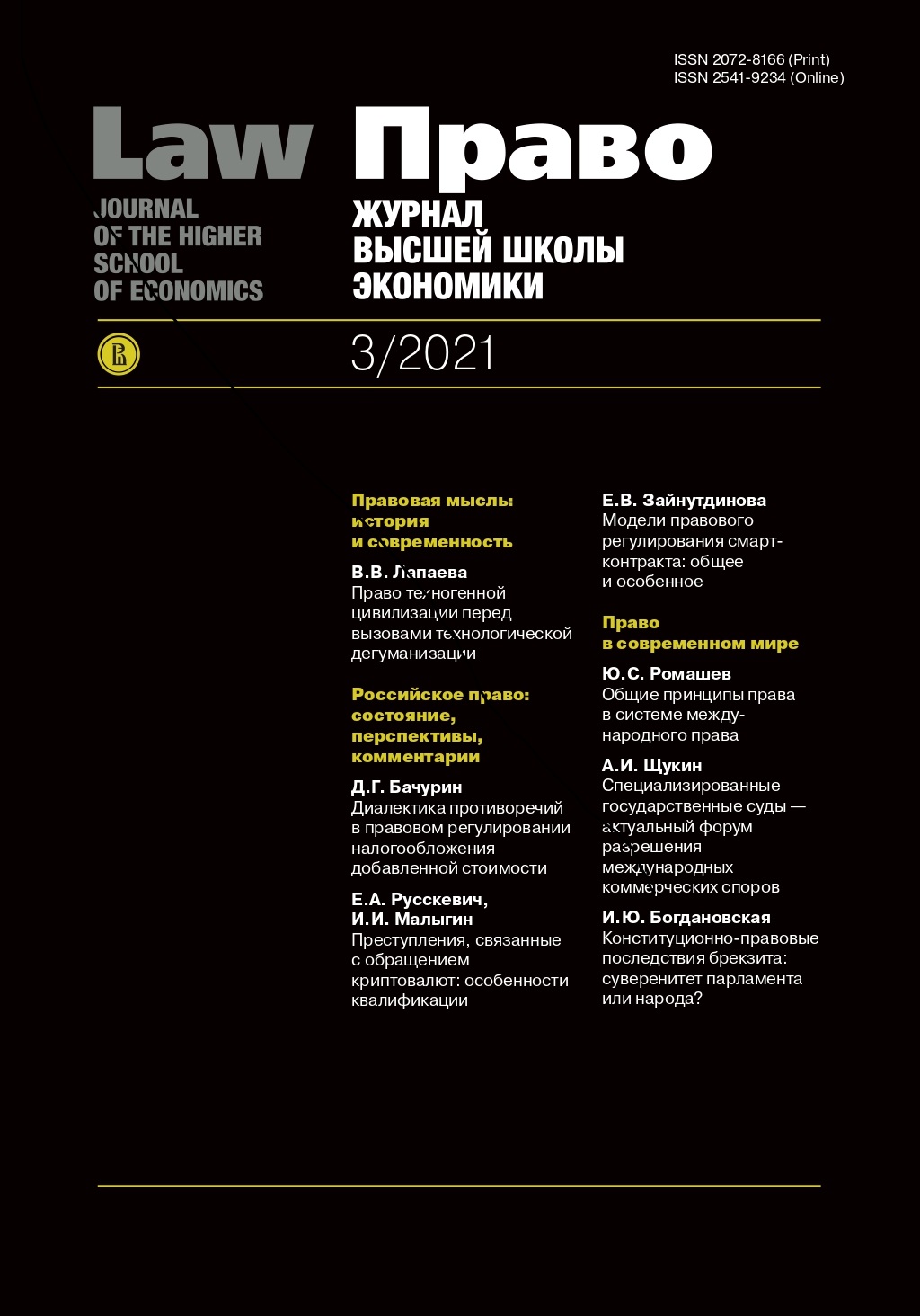Crimes Related to Cryptocurrencies: Features of Qualification
Abstract
Process of penetration of digital financial assets into the daily lives of citizens and the activities of business entities, as well as the steady increase in crimes committed using, with respect to and about cryptocurrencies, actualizes the need for a scientific understanding of the features and problems of their qualifications. The purpose of the study is to develop theoretical recommendations to overcome the problems that arise in connection with the qualification of crimes committed using, in relation to and about cryptocurrencies. The implementation of this goal was achieved by examining the existing positions on the problem in the domestic doctrine of criminal law, assessing the state of domestic criminal legislation, identifying problems in judicial investigative practice. The study is based on the application of general and special methods of research (analysis, synthesis, induction, formal legal, abstract logical, etc.). Based on the study, the author formulates the following conclusions: in modern conditions the following main groups of crimes associated with the use of digital financial assets (cryptocurrencies) in one form or another can be distinguished: a) crimes in which cryptocurrency acts as a means of committing them; crimes in which cryptocurrency acts as an object of encroachment; crimes committed for the purpose of generating (mining) cryptocurrency; the use by a person of cryptocurrency cannot a priori indicate that legalization has taken place. A simple disposal of virtual currency (in order to pay for goods or services) without the intention of giving a legitimate form to criminal proceeds does not contain signs of corpus delicti provided for in Art. 174.1 of the Criminal Code; as an illegal business (Article 171 of the Criminal Code of the Russian Federation), one should qualify a person to carry out activities related to the exchange of cryptocurrency for fiat money and vice versa, aimed at making profit by charging a commission for each operation. Considering that obtaining a license to provide such services is not possible under applicable law, a person will be liable for illegal business, provided that he carried out the specified activity without registration; when qualifying encroachments on cryptocurrency, law enforcement authorities as a systemic problem note the absence in the territory of Russia of a body authorized to assess its value on a specific date. Currently, in the investigation of criminal cases, the determination of the amount of damage caused to the victim is based either on the expert's opinion or by obtaining information about the cryptocurrency rate at the time the crime was committed.
References
Alizade V.A., Volevodz A.G. (2018) Non-application of Art. 174.1 of the Criminal Code of the Russian Federation on drug-related crimes committed using cryptocurrency. Narkokontrol', no 1, pp. 5-13 (in Russian)
Begishev I.R., Bikeev I.I. (2020) The crimes in the digital information field. Kazan: Posnanie publishers, 300 p. (in Russian)
Bykova E.G., Kazakov A.A. (2018) Qualification problems of criminal bankruptcies using cryptocurrency. Ugolovnoe pravo, no 6, pp. 10-15 (in Russian)
Dolgieva M.M. (2019) Countering the legalization of criminal proceeds when using cryptocurrency. Vestnik Tomskogo universiteta, no 4, pp. 213-218 (in Russian)
Dolgieva M.M. (2018) Confiscation of cryptocurrency. Zakonnost', no 11, pp. 45-49 (in Russian)
Gracheva Y.V., Malikov S.V., Chuchaev A.I. (2020) Prevention Deviations in the Digital World by Criminal Law Means. Pravo. Zhurnal Vysshey shkoly ekonomiki, no 1, pp. 188210 (in Russian)
Kunev D.A. (2018) Modern threats of using cryptocurrencies for criminal purposes. Finansovaya bezopasnost', no 20, pp. 60-63 (in Russian)
Lyaskalo A.N. (2019) Cryptocurrency as an object and means of crime. Ugolovnoe pravo: strategiya razvitiya v XXI veke: materialy Mezhdunarodnoj konferencii. Moscow: RG-Press, pp. 87-92 (in Russian)
Nemova M.I. (2018) Criminal law and cryptocurrency: challenges and prospects. Ugolovnoe pravo: strategiya razvitiya v XXI veke: materialy Mezhdunarodnoj konferencii. Moskva: RG-Press, pp. 585-587 (in Russian)
Nemova M.I. (2019) The use of cryptocurrency in the legalization (laundering) of money or other property: acquired by criminal means: analysis of judicial practice. Ugolovnoe pravo, no 4, pp. 63-68 (in Russian)
Pinkevich T.V. (2020) On legal counteraction to cryptocurrencies criminality. Jurist-pravoved, no 4, pp. 45-48 (in Russian)
Prostoserdov M.A. (2016) Economic crimes committed in cyberspace and countermeasures against them. Candidate of Juridical Sciences Summary. Moscow, 28 p. (in Russian)
Sidorenko E.L. (2016) The criminal use of cryptocurrencies: international assessments. Mezhdunarodnoe ugolovnoe pravosudie i mezhdunarodnaya justitciya, no 6, pp. 8-10 (in Russian)
Sidorenko E.L. (2017) Criminological risks of cryptocurrency turnover. Ekonomika. Nalogi. Pravo, no 6, pp. 147-154 (in Russian)
Truncevskij Yu.V., Suharenko A.N. (2019) Countering the use of cryptocurrency for illegal purposes: state and prospects. Mezhdunarodnoe publichnoe i chastnoe pravo, no 1, pp. 43-47 (in Russian)
Copyright (c) 2021 Law Journal of the Higher School of Economics

This work is licensed under a Creative Commons Attribution-ShareAlike 4.0 International License.


















